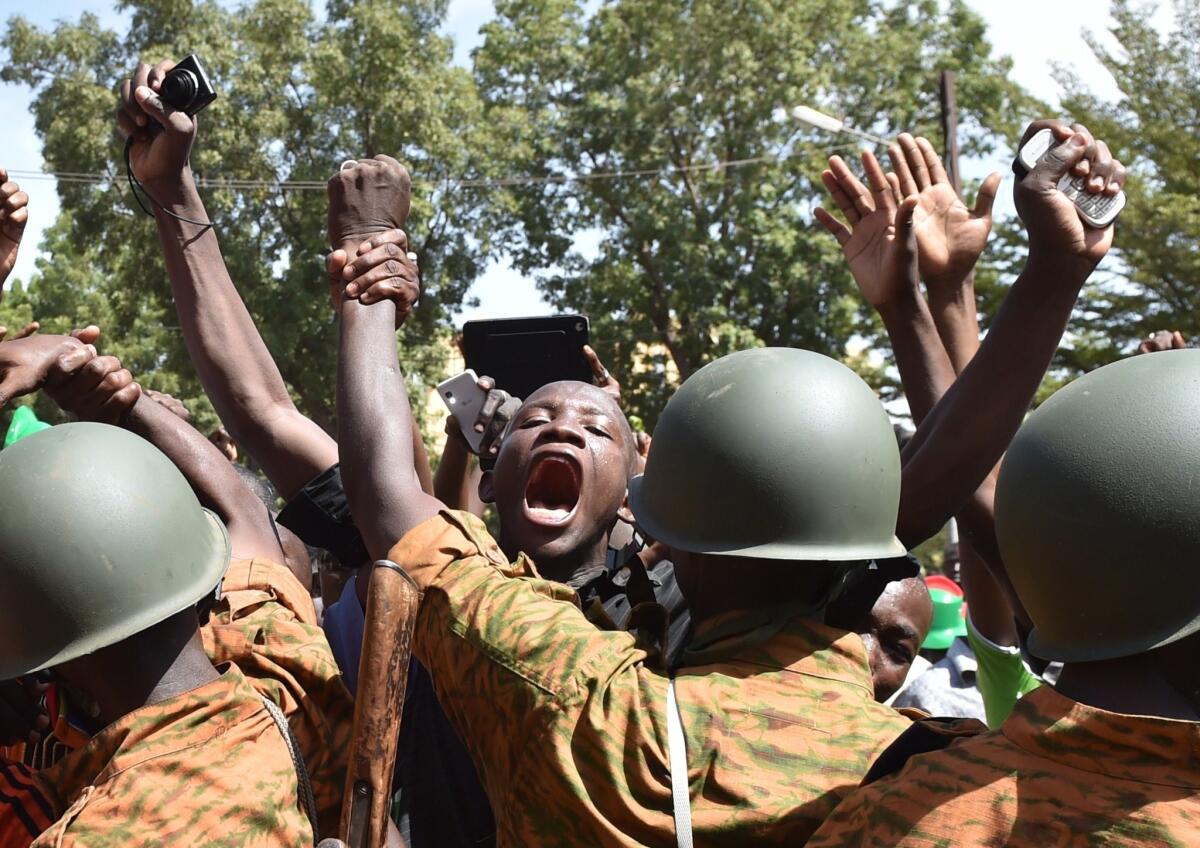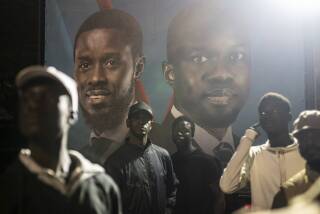General in power after Burkina Faso’s president gives in, steps down

Burkina Faso’s military chief took control of the country Friday after President Blaise Compaore bowed to popular anger and resigned, following his failed attempt to manipulate the constitution so he could seek a fifth term in office.
Gen. Honore Traore told a news conference that “given the power vacuum” created by Compaore’s departure, he would assume the responsibilities of head of state.
“I undertake a solemn engagement to proceed without delay with consultations with all parties in the country so as to start the process of returning to the constitutional order as soon as possible,” Traore said.
The degree of support for Traore remained unclear, as some protesters reportedly consider him too close to Compaore. Some called for former defense minister and retired Gen. Kouame Lougue to take over.
Compaore, one of Africa’s longest-serving leaders, announced his resignation in a statement saying he was vacating power to “put in place a transition” that would lead to elections within 90 days.
The decision by Compaore, a regional power broker whose country has been a stable Western ally, sent political tremors across the continent. His departure marked a democratic milestone, making it seem harder for longtime leaders to cling to power against popular will.
After 27 years in office, he experienced a humiliating defeat after trying to ride out the mass protests and opposition calls for him to quit, insisting he would stay in power another year while a transitional government was installed.
In the end, he was forced out by massive protests, dubbed Burkina Faso’s “Black Spring,” and saw all the major symbols of power in Ouagadougou, the capital, looted and destroyed by furious demonstrators. Protesters opposed a parliamentary vote that was to take place Thursday to change the constitutional limit on presidential terms and allow Compaore to run in elections next year.
After a day of rioting, chaos and looting Thursday, Compaore abandoned his attempt to remove the constitutional limit and promised to give up power late next year, when his term expired. But critics saw it as an attempt to buy time in order to manipulate events and railroad opponents so he could get a fifth term.
Opposition leaders said he had lost popular legitimacy and rejected his attempt to hang on.
Tens of thousands of Burkinabe defied Compaore’s call for calm and renewed their protests Friday, gathering at the Place de la Nation. They also gathered outside the army headquarters, chanting, “You take your responsibility and we will take ours!”
Cheers rang out as Compaore announced his resignation.
He said he had decided to step down for reasons including “the severely deteriorated sociopolitical situation characterized by continued public disorder and looting.” He called for peace and said it was the responsibility of opposition leaders to stop the looting.
“For my part, I believe that I’ve fulfilled my duty,” he said in his statement.
He reportedly headed toward Ghana in a convoy of several dozen SUVs. After his departure, youths looted his residence, reportedly burning hundreds of white T-shirts supporting a “yes” vote in a constitutional referendum, which would have been necessary if the parliamentary vote had failed.
A day earlier, soldiers at the president’s residence had opened fire on protesters trying to storm the building. There were reports that people were killed or seriously injured, but casualties could not be confirmed.
Compaore took power in a 1987 coup, when Burkina Faso’s revolutionary leader, Thomas Sankara, often called Africa’s Che Guevara, was killed by soldiers in mysterious circumstances. Sankara and Compaore were old friends and allies, but there have been murmurings for decades that Compaore may have played a role in the assassination.
The truth about who ordered the killing of Sankara, who remains popular in Burkina Faso, has never been established.
Compaore’s tilt at a fifth term followed an abortive attempt by former Senegalese president Abdoulaye Wade, to seek a third term in 2012, after a constitutional amendment increasing the presidential term to seven years. The move spurred protests, and after opposition leader Macky Sall won election, Wade backed down.
The protests in Burkina Faso had been brewing for months, as opposition leaders urged Compaore not to try to extend his grip on power. But the popular movement to oust him began in earnest Tuesday when crowds massed in Ouagadougou and demonstrators toppled a statue of Compaore in the city of Bobo Dioulasso.
Before the planned parliamentary vote, protesters Thursday braved bullets and surged into the National Assembly, or parliament, setting it ablaze. They ransacked the state television building, closing down broadcasts, and attacked other symbols of power and looted the homes of Compaore family members.
Twitter: @RobynDixon_LAT
More to Read
Start your day right
Sign up for Essential California for news, features and recommendations from the L.A. Times and beyond in your inbox six days a week.
You may occasionally receive promotional content from the Los Angeles Times.






